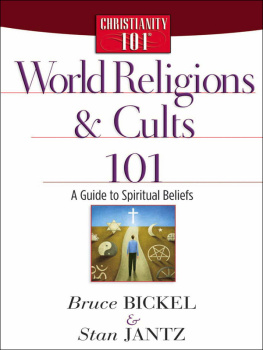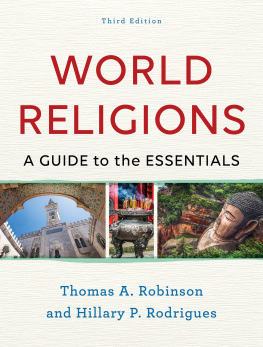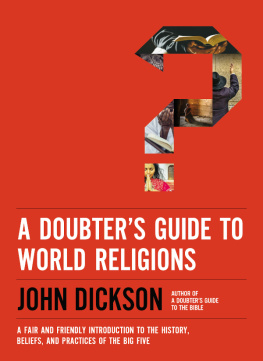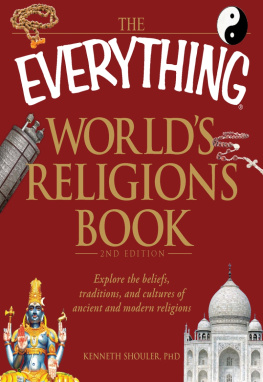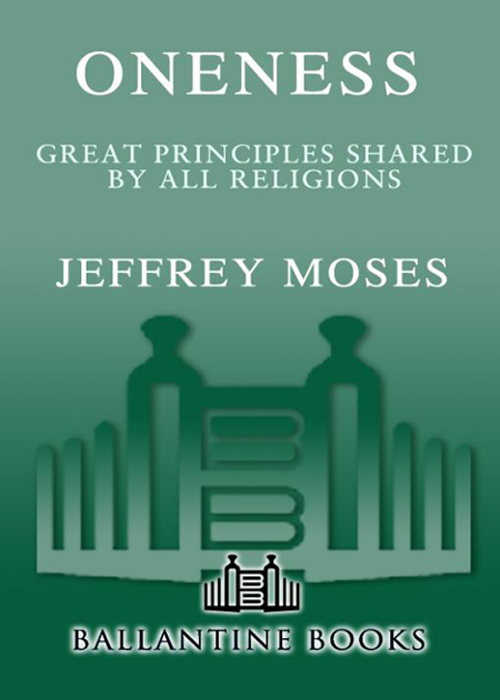
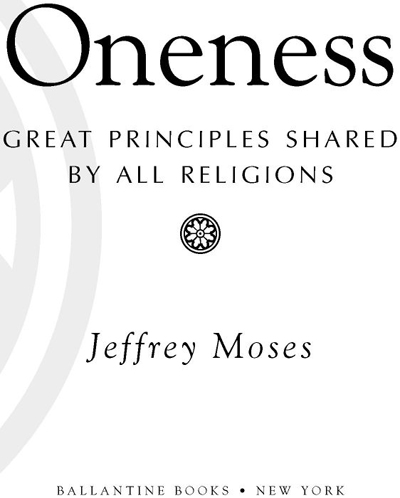
Table of Contents
To my wife, Ruth, whose love, devotion, patience,
and ongoing research and editing assistance
helped bring this book to light
In memory of Mother Teresa, for her kind words, inspiration,
and prayers during the writing of this book
To His Holiness the Dalai Lama,
for his encouragement and attention
in writing the Introduction
To His Holiness Maharishi Mahesh Yogi,
the embodiment of Vedic wisdom
To Dr. Anita Figueredo,
who introduced me to Mother Teresa
To my father and mother, Robert and Barbara;
to my brothers and sister, Brad, Julie, Marc, and Mathew,
who have always thought the highest of me
And to Gina Centrello, Anthony Ziccardi,
Maureen ONeal, Patricia Peters, Stacy Berenbaum,
Tracy Bernstein, Elizabeth Zack, Joelle Delbourgo,
Ed Walters, and others at Ballantine/Random House
who have championed Oneness

ONENESS
Throughout the ages, the scriptures of all religions have proclaimed that humanity is one great family. This is a simple truth, and it is simply and directly stated in every religion. In fact, almost all the principles that are associated with religious thought are shared by every religion. The Golden Rule, Love Thy Neighbor, Honor Thy Father and Mother, Speak Truth, It Is More Blessed to Give Than to Receivethese precepts and many others are common to all religions, and are very similarly expressed in each.
When their inherent similarities are revealed, the collected wisdom of the worlds religions shows a profound Oneness of the human spirit. When placed side by side with surprisingly similar wording in many instancesthe essential beliefs shared by all religions confirm that our differences are superficial, and that our similarities are deep.
They have the overwhelming effect of creating unity, where differences dissolve and the soul can wonder, Why do we have such conflicts?
These volumes of spiritual wisdom have another value, on a very personal level for each individual. When their most fundamental themes are gathered and compared directly, as in this book, they become like a guide or a blueprint for the inner development of mind and spirit. They form the basis not only for how nations can live together peacefully, but also for how individuals can structure their lives to achieve success, happiness, and spiritual fulfillment.
This book is the result of research that took place over many years. There are numerous volumes of scriptures for many of the worlds religions, each with varying translations, the majority in archaic and complex language. Yet as I read through the scriptures, the universally familiar sayings jumped forth. Each, when discovered, was like a nugget that seemed to have been waiting for centuries to be uncovered and directly compared to similar expressions in other religions.
After several years of research, by 1981, I had gathered sayings for about twenty important and widely recognized main principles. At that time, it was unheard of to compare directly the line-by-line similarities of religious texts. I felt that I needed validation that my research was meaningful and that it would encourage harmony, not further division.
It so happened that Mother Teresa, who had recently won the Nobel Peace Prize, was in the United States, visiting her missions around the country. Feeling that she, of all people, was admired by followers of many religions, I contacted her, showing her my collection of compared sayings. I had the opportunity to speak with her on several occasions. She greatly appreciated the concept of Oneness, and she was kind enough to write an introduction for the book.
With my resolve strengthened, I continued my research. Within a year I had compiled a self-published edition that included sayings for twenty-five central principles. Several bookstore managers I approached with the book were fascinated by the concept. One placed a thick stack of books in a stand by the cash register. Two days later he called asking for more copies.
He described what he had observed in customers faces as they flipped through the pages and understood what the book was about. Their eyes lit upsurprised to have suddenly found something they had been looking for in many places for a long time.
In 1989, the Ballantine Publishing Group published the first edition of Oneness: Great Principles Shared by All Religions. That edition, which had thirty central principles, included an introduction and special prayer by Mother Teresa, as well as a testimonial by the Dalai Lama, who was awarded the Nobel Peace Prize a few months after Oneness was released.
Since then I have continued my research, expanding to sixty-four the number of great central principles that appear in this current book.
In every scripture, the great principles are repeated and re-phrased in various ways. To keep the book simple and readable, however, I have chosen one representative saying from each religion.
As an example, the principle Honor Thy Father and Mother is universal to all religions. The following sayings are all found in the scriptures of Islam. Only the first saying was used in Oneness, but the others are just as beautiful and appropriate.
Serve and revere your parents. Heaven is spread beneath the feet of mothers everywhere.
Hadith
He who wants to enter Paradise at the best door must please his father and mother.
Hadith
Thy Lord hath decreed that ye worship none but Him, and that ye be kind to parents. Whether one or both of them attain old age in thy life, say not to them a word of contempt, nor repel them, but address them in terms of honor.
Quran 17:23
There is no child who is a doer of good to his parents who God will not look at with great favor.
Hadith
We have enjoined on man (to be good) to his parents: in travail upon travail did his mother bear him, and in years twain was his weaning.
Quran 31:14
Messenger of God, who is most deserving of friendly care from me? Mohammed replied, Your mother. He asked who came next, and He replied, Your mother. He asked who came next and He replied, Your mother. He asked who came next and He replied, Your father.
Hadith
Similarly, numerous expressions of Honor Thy Father and Mother (and for all the other principles contained in Oneness) could have been cited from Christianity, Judaism, Buddhism, and from all other religions. To do so, however, would have sacrificed the readability of the book. Oneness includes a simple collection of sayings written on facing pages in an uncluttered way. My hope is that the silence of the white page surrounding the quotes gives the readers soul a chance to assimilate the comparisons, and to contemplate the great truths contained in each.
I encourage anyone who is interested to read from the scriptures directly. For information about how to locate the scriptures, please refer to the section Sources and Suggested Readings near the end of this book.
Since the time of writing and publishing the first
Next page

